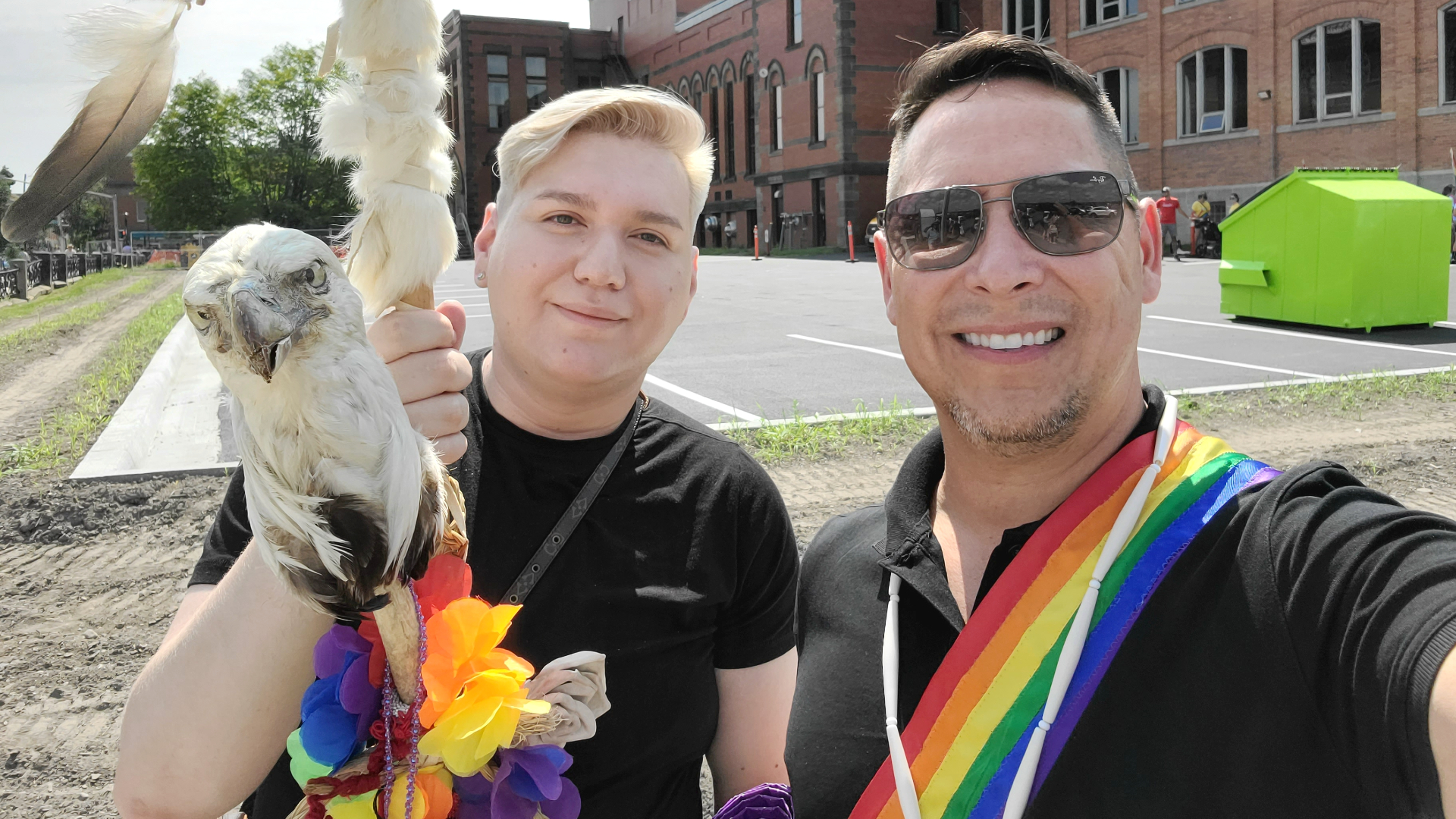More than a decade ago, when a rash of suicides ravaged a First Nation in Canada’s Atlantic region, John R. Sylliboy was approached by a friend to help address the tragedy.
“My colleague, friend, mentor and co-founder of the Wabanaki Two Spirit Alliance, Tuma Young, reached out to me,” Sylliboy, a Mi’kmaw educator and PhD student in education, recalls in a video interview with Xtra. “I just recently came out to my family and community and my friend said, ‘Listen, there’s a crisis going on, there’s a situation that’s happening in our communities, and we have to prevent further harm or people harming themselves because of who they are.’”
According to Sylliboy, one community recorded 10 suicides in a single year, and four of those who died were Two-Spirit people. Together with Young, the duo brought more than 50 Two-Spirit folks for a gathering in the Atlantic region.
“We began our work then. We started building through advocacy, knowledge building and celebrating who we are through gatherings,” Sylliboy says. “We just needed to bring our resources together, the most important resource being people.”
Now, more than a decade later, Wabanaki Two Spirit Alliance has helped Two-Spirit and LGBTQ+ folks through a series of discussions, community engagement initiatives, needs assessments and research projects.
Sylliboy says one of the biggest challenges they faced is the lack of data about Two-Spirit and other queer and trans Indigenous people.
“There were hardly any statistics around what we do, who we are and even just cultural awareness around Two-Spirit identity, and any of the information that may have existed was sort of negative, based on suicide or health disparities,” Sylliboy says.
“We wanted to change that narrative to something that was strength-based, more resilience-based, and to share the wealth of who we are, based on our cultural understandings of who we are: language, ceremony, practices.”
Wabanaki Two Spirit Alliance, now a non-profit organization, has grown over the years from a small group of concerned people to now having more than 1,000 members on social media; their work is ongoing—especially now, as Canada dives head first into another federal election.
Xtra spoke with Sylliboy about the election, Two-Spirit awareness and reconciliation.
It’s been a challenging time. How did the pandemic affect your work?
We’ve always applied for program funding for different little projects, but never core funding or substantial funding. Last year we had no choice, because we had an increased amount of needs in the community.
We reached out to our folks and said, “How can we collaborate?” We used a survey as a way to understand the dimensions of what people were going through in their mental health, their spiritual well-being, their physical deterioration and even their cultural disconnect with other people because we weren’t able to gather as a community. The gatherings are medicine; it’s healing for them to see people who speak the language, who share common experiences.
As Two-Spirit folks, we have to find creative ways to bring people together [virtually, during the pandemic], so we found funding from the Department of Women and Gender Equality, federal funding and with other partners.
As Canada heads to the polls this month, how can a new government collaborate with your organization?
We’re looking at how we’re going to collaborate with the government and people in different departments that represent health needs and education needs, and overall well-being for Two-Spirit folks in all levels of government, not only the federal government.
We’re trying to navigate the best way possible to see scenarios—what can happen, what we can expect—and we are determined not to wait for any government to reach out to us. We’re going to be on the side of building relations with our government because that’s what’s expected of our treaty relations.
“It’s a multi-dimensional approach to how we can collaborate with a new government. We can’t do it alone.”
Whatever government comes in, we’ll just go and reach out and say, “Okay, this is who we are, this what we do, let’s find a middle ground on how we could improve the outcomes of people’s lives, who are Two-Spirited, in our region.”
So you’re being proactive?
It’s a multi-dimensional approach to how we can collaborate. We can’t do it alone. We know that. So we’ve relied a lot on our partnerships with organizations in the Atlantic region, within Nova Scotia and each province we’ve been building those relationships.
We also started looking at how we are going to inform folks about who we are, and we’ve been working nationally with the [LGBTQ2] Secretariat, for example; we’ve been working nationally with the Department of Women and Gender Equality and with the Ministry of Culture.
Just this week, we had an interesting call where the Two-Spirit councils across Canada, including Wabanaki Two Spirit Alliance, sat down and provided an online workshop around who we are as Two-Spirit people, and we shared the report from the [National Inquiry into] Missing and Murdered Indigenous Women, Girls and Two-Spirit folks.
We also have to look at federal legislation and what UNDRIP (United Nations Declaration on the Rights of Indigenous Peoples) says around gender and sexuality equality, and make sure that we get it right within an Indigenous worldview and context.
We have to have an expansion of services for programs that are targeting Two-Spirit LGBTQ+ people. It’s challenging when agencies that collect data for health, for example, do not use language that captures Two-Spirit perspectives, or data around who we are or our demographics, because they’re not asking those questions and [using those] surveys and census collection tools.
Why do you think there aren’t a lot of programs targeting Two-Spirit LGBTQ+ people?
Often Two-Spirit folks fall through the cracks because they’re not included in talks or engagements, or we’re not included because of the heteronormative practices that a lot of these areas have. When you have heteronormative practices and then systemic barriers that may often be racist, or exclusive only to mainstream 2SLGBTQIA+ organizations, we’re lumped together under an umbrella.
Two-Spirit organizations are just coming into light as their own leaders, as self-determining and self-governing organizations that lead the way for ourselves. We have to redirect resources to go right into our organizations rather than other third parties that often hold the funds for us.
As the federal party leaders do their rounds, what do you want to hear from them on promises that affect Two-Spirit people specifically, and Indigenous people in general?
They should have an immediate sense and understanding of the social determinants of health—what has impacted us through Indian residential schools, through Indian day schools, through colonialism. They should be able to have that knowledge and ability to communicate the Truth and Reconciliation Commission (TRC)’s Calls to Action, or at least the basics of those. They should understand the calls to justice for the Missing and Murdered Indigenous Women, Girls, and Two-Spirited folks, and then address the 2SLGBTQIA+ National action plan moving forward.
“There’s a lot of talk across Canada around what reconciliation should look like—and they’re still off the mark on where we should be at.”
They should be able to look at those minimum documents and say, “I get some of it, not understand fully, but I should be able to learn where to seek and where to provide guidance if I don’t understand.”
Also, they should try to have in their platforms that component that is Two-Spirit, not only the LGBTQ with 2S at the end [of the initialism] where they usually have it. We’re recommending that 2S be at the beginning as a foundational component of understanding who we are as Two-Spirit folks, who may be distinct in needs from the mainstream LGBTQ need.
You mentioned the TRC’s Calls to Action. On the topic of reconciliation, what should a new government do to reconcile its relationship with Indigenous people in this country?
For Indigenous folks, there’s a lot of talk across Canada around what reconciliation should look like—and they’re still off the mark on where we should be at from 2015 [when the TRC report was first delivered] to now.
Reconciliation really has to be at many different levels because it also has to happen within our own Indigenous communities. For the Two-Spirit population, for people who live in First Nations who may be affected still by colonial practices—whether that’s Christianity or Westernized views of what gender is or sexuality and not accepting of Two-Spirit folks because of our communities adopting other ways of belief—we have to look at it from all angles. But for reconciliation to happen for our Indigenous folks, the first thing the government needs to do is look at the immediate needs that we’re calling for in the recommendations laid out in the National Action Plan.
What do you hope to see in a new government?
We’re hoping it continues the commitment that was made for funding 2SLGBTQ+ organizations and implementing strategies to provide for the community in ways that improve health outcomes and education outcomes. For the next government, if it’s not the Liberals, if it’s another government, to continue building on toward that.
As we grow and understand the dimensions of gender and sexuality and the many ways people fit into the queer community, that also reflects a huge demographic of needs, and we need to address those. It’s not enough to throw money at Pride events one summer, some sort of place to celebrate who we are for a week or two.
We need health care. We have educational needs, we have employment needs, we need continuity and sustainability in funding for our organizations as we move forward in order to continue to advocate, research and build knowledge around who we are.
We hope that the government, whoever it is that comes in, continues with the process that we’ve been working with for decades.
The interview has been edited for length and clarity.


 Why you can trust Xtra
Why you can trust Xtra


